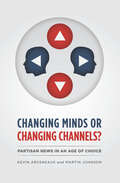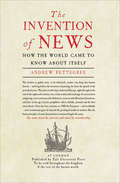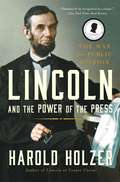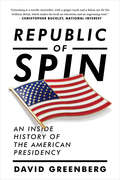Special Collections
Goldsmith Book Prize
Description: The Goldsmith Book Prize is awarded to the trade and academic book published in the last 24 months that best fulfills the objective of improving democratic governance by examining of the intersection between the media, politics and public policy. #award
- Table View
- List View
Changing Minds or Changing Channels?
by Martin Johnson and Kevin ArceneauxWe live in an age of media saturation, where with a few clicks of the remote--or mouse--we can tune in to programming where the facts fit our ideological predispositions. But what are the political consequences of this vast landscape of media choice?
Partisan news has been roundly castigated for reinforcing prior beliefs and contributing to the highly polarized political environment we have today, but there is little evidence to support this claim, and much of what we know about the impact of news media come from studies that were conducted at a time when viewers chose from among six channels rather than scores.
Through a series of innovative experiments, Kevin Arceneaux and Martin Johnson show that such criticism is unfounded. Americans who watch cable news are already polarized, and their exposure to partisan programming of their choice has little influence on their political positions. In fact, the opposite is true: viewers become more polarized when forced to watch programming that opposes their beliefs.
A much more troubling consequence of the ever-expanding media environment, the authors show, is that it has allowed people to tune out the news: the four top-rated partisan news programs draw a mere three percent of the total number of people watching television.
Overturning much of the conventional wisdom, "Changing Minds or Changing Channels?" demonstrate that the strong effects of media exposure found in past research are simply not applicable in today's more saturated media landscape.
The Invention of News
by Andrew Pettegree&“A fascinating account of the gathering and dissemination of news from the end of the Middle Ages to the French Revolution&” and the rise of the newspaper (Glenn Altschuler, The Huffington Post). Long before the invention of printing, let alone the daily newspaper, people wanted to stay informed. In the pre-industrial era, news was mostly shared through gossip, sermons, and proclamations. The age of print brought pamphlets, ballads, and the first news-sheets. In this groundbreaking history, renowned historian Andrew Pettegree tracks the evolution of news in ten countries over the course of four centuries, examining the impact of news media on contemporary events and the lives of an ever-more-informed public. The Invention of News sheds light on who controlled the news and who reported it; the use of news as a tool of political protest and religious reform; issues of privacy and titillation; the persistent need for news to be current and for journalists to be trustworthy; and people&’s changing sense of themselves and their communities as they experienced newly opened windows on the world. &“This expansive view of news and how it reached people will be fascinating to readers interested in communication and cultural history.&” —Library Journal (starred review)
Media Commercialization and Authoritarian Rule in China
by Daniela StockmannIn most liberal democracies commercialized media is taken for granted, but in many authoritarian regimes the introduction of market forces in the media represents a radical break from the past with uncertain political and social implications. In Media Commercialization and Authoritarian Rule in China, Daniela Stockmann argues that the consequences of media marketization depend on the institutional design of the state. In one-party regimes such as China, market-based media promote regime stability rather than destabilizing authoritarianism or bringing about democracy. By analyzing the Chinese media, Stockmann ties trends of market liberalism in China to other authoritarian regimes in the Middle East, North Africa, sub-Saharan Africa, and the post-Soviet region. Drawing on in-depth interviews with Chinese journalists and propaganda officials as well as more than 2,000 newspaper articles, experiments, and public opinion data sets, this book links censorship among journalists with patterns of media consumption and media's effects on public opinion.
Lincoln and the Power of the Press
by Harold HolzerFrom his earliest days, Lincoln devoured newspapers. As he started out in politics he wrote editorials and letters to argue his case. He spoke to the public directly through the press. He even bought a German-language newspaper to appeal to that growing electorate in his state. Lincoln alternately pampered, battled, and manipulated the three most powerful publishers of the day: Horace Greeley of the New York Tribune, James Gordon Bennett of the New York Herald, and Henry Raymond of the New York Times.
When war broke out and the nation was tearing itself apart, Lincoln authorized the most widespread censorship in the nation's history, closing down papers that were "disloyal" and even jailing or exiling editors who opposed enlistment or sympathized with secession. The telegraph, the new invention that made instant reporting possible, was moved to the office of Secretary of War Stanton to deny it to unfriendly newsmen.
Holzer shows us an activist Lincoln through journalists who covered him from his start through to the night of his assassination--when one reporter ran to the box where Lincoln was shot and emerged to write the story covered with blood. In a wholly original way, Holzer shows us politicized newspaper editors battling for power, and a masterly president using the press to speak directly to the people and shape the nation.
Political Journalism in Comparative Perspective
by Erik Albæk Arjen van Dalen Nael Jebril Claes H. de Vreese and Erik Albæk and Arjen Van Dalen and Nael Jebril and Claes H. de VreesePolitical journalism is often under fire. Conventional wisdom and much scholarly research suggest that journalists are cynics and political pundits. Political news is void of substance and overly focused on strategy and persons. Citizens do not learn from the news, are politically cynical, and are dissatisfied with the media. This book challenges these assumptions, which are often based on single-country studies with limited empirical observations about the relation between news production, content, and journalism's effects. Based on interviews with journalists, a systematic content analysis of political news, and panel survey data in different countries, this book tests how different systems and media-politics relations condition the contents of political news. It shows how different content creates different effects, and demonstrates that under the right circumstances citizens learn from political news, do not become cynical, and are satisfied with political journalism.
Republic of Spin
by David Greenberg
In Republic of Spin—a vibrant history covering more than one hundred years of politics—presidential historian David Greenberg recounts the rise of the White House spin machine, from Teddy Roosevelt to Barack Obama. His sweeping, startling narrative takes us behind the scenes to see how the tools and techniques of image making and message craft work. We meet Woodrow Wilson convening the first White House press conference, Franklin Roosevelt huddling with his private pollsters, Ronald Reagan’s aides crafting his nightly news sound bites, and George W. Bush staging his “Mission Accomplished” photo-op. We meet, too, the backstage visionaries who pioneered new ways of gauging public opinion and mastering the media—figures like George Cortelyou, TR’s brilliantly efficient press manager; 1920s ad whiz Bruce Barton; Robert Montgomery, Dwight Eisenhower’s canny TV coach; and of course the key spinmeisters of our own times, from Roger Ailes to David Axelrod.
Greenberg also examines the profound debates Americans have waged over the effect of spin on our politics. Does spin help our leaders manipulate the citizenry? Or does it allow them to engage us more fully in the democratic project? Exploring the ideas of the century’s most incisive political critics, from Walter Lippmann and H. L. Mencken to Hannah Arendt and Stephen Colbert, Republic of Spin illuminates both the power of spin and its limitations—its capacity not only to mislead but also to lead.
Democracy’s Detectives
by James T. HamiltonInvestigative journalism holds democracies and individuals accountable to the public. But important stories are going untold as news outlets shy away from the expense of watchdog reporting. Computational journalism, using digital records and data-mining algorithms, promises to lower the cost and increase demand among readers, James Hamilton shows.




